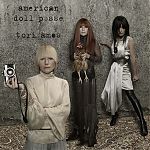- Articles
- Cherries
- Minutiae
- Q&A
- RAINN
- Releases
- Reviews
- Site News
- Them
- Toriphiles
- Touring
- TV/Radio/Web
- Video
News Archives
Keep an eye on our Twitter and Facebook pages since we often post quickie updates there when we're on-the-go.
During tours, we do our best to cover setlists in real-time on Twitter. If you want to tweet a show in, just DM or @ us on the day and tell us to watch your stream that night.
Tori is touring in 2017 to support the release of Native Invader. The European legs runs from early September through early October and the North American leg runs from late October to early December. We do not know if additional dates elsewhere will be added.

Native Invader (album, 2017)

Unrepentant Geraldines (album, 2014)

Gold Dust (album, 2012)

Night of Hunters (album, 2011)

Midwinter Graces (album, 2009)
 Abnormally Attracted To Sin (album, 2009)
Abnormally Attracted To Sin (album, 2009)
Live at Montreux 1991/1992 (DVD, 2008)

American Doll Posse (album, 2007)

A Piano (boxed set, 2006)

Pretty Good Years
(bio, 2006)

Fade To Red
(DVD, 2006)
 Comic Book Tattoo (book, 2008)
Comic Book Tattoo (book, 2008)News: Washington Blade Interview (September 27, 2012)
The thing about a remix is you don’t have to retain the narrative or even the spirit of the original work in the same way. So the “Professional Widow” remix, for example, became a very different expression of the song from the original. Some of that narrative was there but not the way it was on the (album version). And yet the remix still clearly did its job. But in doing something like [Gold Dust], you don’t want to lose the song’s story or her narrative in any way, so it was important to really, and sometimes very subtly, make changes.
The Washington Blade’s Joey DiGuglielmo did a phoner with Tori and the resulting interview went up on The Blade’s website earlier this week. While hitting the usual questions about Gold Dust and The Light Princess, DiGuglielmo takes a slightly different slant and Tori’s responses shine a brighter light on her creative process, both for the new album an in general, than most of the other recent pieces.
Thanks to Jon for the pointer!
Girl reappearing
By Joey DiGuglielmo on September 27, 2012
Tori Amos is straight but has a strong LGBT fan base. The Blade’s Joey DiGuglielmo is a long-time fan, having worn out a copy of “Boys for Pele” in the throes of closeted college-era angst. He talked to her by phone two weeks ago to talk about her new album “Gold Dust,” which features orchestral re-workings of 14 of her songs. It’s slated to drop Tuesday in the U.S.
Blade: Hi Tori
Tori Amos: Hi, how are you?
Blade: I’m good. I’m gonna try to cover a lot of ground really quickly so I’m just gonna jump right in. Tell me a little about the relationship you have going with Deutsche Grammophon. This is your second project with them. Are you under contract or are you just doing things on kind of an album-by-album basis?
Amos: Kind of album by album. … They came up with the idea of the variations on the masters (last year’s “Night of Hunters” album) but when I’d been working with the Metropole Orchestra the year before and they basically said, “We need recordings of this. This is the 20th anniversary of your work and this is how you do it with an orchestra.” I didn’t know, at first, if that made sense, but it seemed to make sense in their German minds. So it’s been very organic.
Blade: I’m just wondering how some of these arrangements came about and thinking back to some of those great remixes you had of your stuff back in the late ‘90s. Obviously I know remixing is a whole different thing altogether, but in terms of crafting symphonic arrangements or reworkings of your songs — where these songs are very much living in an alternate space from their original studio versions — I’m wondering if any of the same artistic considerations or principles apply as would if you’re crafting an alternate version in the form of a remix.
Amos: Wow, that’s a great question. I guess the thing about a remix is you don’t have to retain the narrative or even the spirit of the original work in the same way. So the “Professional Widow” remix, for example, became a very different expression of the song from the original. Some of that narrative was there but not the way it was on the (album version). And yet the remix still clearly did its job. But in doing something like this, you don’t want to lose the song’s story or her narrative in any way, so it was important to really, and sometimes very subtly, make changes. Some of the songs didn’t want a makeover. Some of them said, “Only strings,” or others said, “We’re open to a full orchestra but we don’t want to become completely overtaken.” It was almost like you were changing their outfit, but you were not changing their soul. Some were open to a more radical flavor. Like with “Flavor,” for instance, which was originally recorded with loops, it really stepped forward and said, “I want a completely different approach.” Or with “Precious Things.” It kind of said it thought its narrative could work with a more Prokofiev-inspired approach.
Blade: What was the time frame for this album?
Amos: I was rehearsing (with the Metropole Orhestra) for shows in October, 2010 and then we got back together in early 2011 and began recording some, but then we put it away because we went and did “Night of Hunters” with the octet. So that project came first, even though this was the first idea. Then we put the (“Gold Dust”) reels back on, I’d say maybe January 2012 and … began editing them together. Overdubs and mixing were finished in July.
Blade: Classical musicians can be notoriously snobby. Did you get any vibe from the Metropole players, even if they never said anything, that they were thinking, “Why are we doing this — can’t somebody bring us some Beethoven or something?” You do all kinds of stuff, obviously, but the grand scheme of things, your songs would be considered in more of the pop idiom than classical.
Amos: It was really a collaboration with them and I think the reason Alex (Burh, the Deutsche Grammophon exec who suggested “Night of Hunters”) suggested it is because he could tell there was a real conversation happening during the rehearsals (for the 2010 concert). There was definitely an affinity and a back-and-forth-type thing that was going on and I think that was why the decision was made to document and record it. There was a chemistry.
Blade: You’ve done a few theme projects now — a holiday album, some concept albums, a classical album, now orchestral reworkings of your songs. Do you have a private bucket list of stuff you want to eventually do? I’m not even necessarily asking what all those projects might be, but do you think, “Well, before I hang up my hat, I definitely want to do — blank.” Does your artistic mind work that way?
Amos: Yes, it thinks that way. I think right now I’m really focused on the musical, “The Light Princess.” Nick Hytner is very much a powerful force at the National Theatre in Great Britain and so hopefully the plan or the idea is that the piece will be ready to get put on its feet within, oh I don’t know, a year, maybe a little over a year. That’s what I have on my brain right now. But yeah, I approach things as a conceptualist and there are all kinds of thoughts that have come into my mind. I would love to someday do something where I just stay someplace and perform. I don’t know if you’d call it an evening in Las Vegas or what, but with a story and dancers. I would love to do something at Caesar’s Palace someday. And not just campy, you know, but maybe a bit of camp, but I love the idea of having dancers — not me dancing, I would be playing and singing — but have some dancers onstage and just make it an incredibly entertaining evening. Very much an old-school variety show with great costumes and an old Hollywood feel. Something like from the ‘30s or ‘40s where you get dressed up and come to a show and have dinner and walk away feeling like you’ve had a really glamorous evening.
Blade: Well, I would definitely come see it, that sounds fun. One thing I’ve always really admired about you is that you don’t always make things easy on the fans or present the material in such a way that it’s easy or accessible for the most casual fan, to say nothing of the material itself. I’m talking about things like those Icon or Playlist anthology CDs where they throw them together for all kinds of artists and make them something that’s meant to be a $7.99 impulse purchase in the checkout lane at Target. You never do things like that. And I’m not even saying it’s necessarily a bad thing ….
Amos: (interjects) … It is bad.
Blade: OK, why? Couldn’t you argue that it might pique someone’s curiosity and inspire them to then go dig deeper?
Amos: I’m telling you, it’s sinning against your art. That’s what you’re doing. It’s lazy.
Blade: Do you have business people approach you with these kinds of ideas?
Amos: Well, you know. There are all kinds of ideas that get spun about. But you have to have it in your head whether it’s a good idea or not. How are you going to feel about it in three months, in six months? What kind of statement does it make about you as an artist? And hey, sometimes I understand why they release these anthologies because something like (“Gold Dust”), I mean this takes a LOT of time to do. We started October 2010 so we’re talking two years from inception to this. It started with them inviting me to come play a show but it didn’t matter if it was one show or 200 shows or if we recorded the arrangements or not, the work still had to be done. The arrangements still had to be made for, like, 20 songs. (Arranger) John Philip Shenale and I were in touch everyday about this for one show, which is all I initially thought it was going to be. Not for one second did I think this would end up being a studio album. They invited me for this before the Alex, the German musicologist, invited me to come start messing with the masters. So that was the genesis and the time frame and doing a project like this with an orchestra is really tricky because people have attachments to the original versions. You really want to retain the soul of the song girl and like I said, some didn’t want extreme makeovers. That wasn’t really the challenge. It’s not about trying to shock people or try to decide how different you can make it. That’s almost too easy. It’s easy to shock people that way, to turn something totally on its head. I think what’s much trickier to do is to subtle because subtle changes can also become real banal and lifeless if you’re not careful.
Blade: I interviewed Sophie B. Hawkins a few weeks ago, who has a fabulous new album out by the way. I highly recommend it. I’m wondering if you feel any sense of sisterhood or artistic kinship with other women who came along in the ‘90s about the same time you did. You’ve managed to continue to forge ahead against the odds, while so many artists from that time have seen their audience dry up or move on. What advice would you give to other women who are highly talented musicians and still feel they have something great to offer?
Amos: It is really tough out there and it’s culturally tough because the masses seem to be gravitating to the next people and artists are seen as very disposable. They want to move on to whomever is next instead of growing with them. I have always wanted to grow with the artists and jump on the train with them. I wanted to know what they were experiencing and wanted to be seen as their patron. That’s how I think of my audience — I very much see them as my patrons, the people who come to my shows. Because without them, I couldn’t keep going. Also, philosophically, people seem to be of the mindset often, that it’s OK to just take something. I would never go to a wine show and slip a bottle of wine in my bag when the vendor wasn’t looking but people have talked themselves into thinking that that’s OK. Meanwhile orchestras are shutting down and you have … very accomplished musicians thinking about how they’re going to make a living doing their art. This is what I’m hearing from a lot of musicians. Do I have an answer? No, I don’t. I think it’s a cultural crisis.
Blade: Isn’t it partly short attention spans too?
Amos: Well yes, that and not wanting to grow. I would like to say that eventually people will realize how sad it is and that it will turn itself around but one of the reasons for the short attention spans is these shows where the next crop is waiting in the wings for its 15 minutes. These shows are making a lot of money but they don’t care about these singers. All they care about is the next show. Nobody is nurturing these artists.
Blade: A lot of people tape your shows and trade them around. Are you OK with that as long as they’re not trying to profit off them? Say they couldn’t make it to the show in Denver and you did this new song — which has always been one of the cool things about you, that your set list changes all the time.
Amos: I don’t have a problem with that but please, use good mics! Now obviously, if you’re trying to sell it, then I have a problem. I think my community knows how it goes. They know where I stand on stuff like that. I’ve even had people tell me they knew somebody who fell on hard times and couldn’t go to one of the shows. OK, but one day when you can, give back. I support the arts. Like visual artists — I go to galleries and support artists all the time.
Blade: I have a somewhat self-indulgent question I’m gonna squeeze in here but maybe it will apply to some other fans too. I play in a church so the challenge really becomes digesting so much new music all the time. What advice would you give to a church pianist or organist where there’s never time to polish anything or let it settle into the brain or fingers before you’re onto the stuff for next Sunday?
Amos: I think you should all be revisiting things on some kind of a rotating schedule. So maybe you revisit something, say, three months later and it becomes part of your repertoire and that way you develop a repertoire. I don’t think things just have to be performed one time. People will say, “Oh, I recognize that, I like that piece.”
Blade: I guess the cynic in me thinks they’ll think, “Oh, that again — he must have had a busy week.”
Amos: Well, OK, I guess some might think that but you can’t lie to yourself. The only other thing you can do is carve out more rehearsal time for yourself, but yeah, I can imagine it is tough.
Blade: Are you a keeper by nature? Do you have clothes from old video shoots and, like, all the “Doll Posse” wigs and stuff like that?
Amos: Yes, I have all that. And yes, (daughter) Tash dresses up in them all the time.
Blade: How many pianos do you own?
Amos: Well that’s tough to say because I have a deal with Bosendorfer so I can trade them out.
Blade: I can’t imagine what your tuning bill must be.
Amos: Well, we have different tuners in different countries. The Bosendorfer at the beach house in Florida, we have this lovely lady who has this twinkle in her eye. And then there’s the one where we record in Cornwall. But Ann has gotten the Florida one where it doesn’t need as much because it’s not being recorded. She’s really got it stable right now and it’s not being moved, so it tends to hold its tuning pretty well. When we’re recording, we tune once a week.
Blade: I love the new album, thanks so much for your time.
Amos: You take care honey, thanks.


